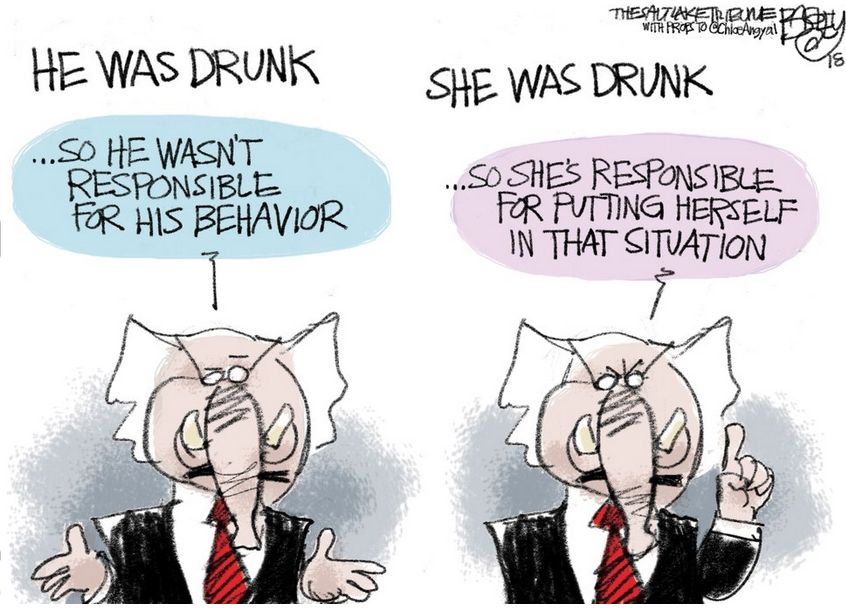Comic Strip of the Day: Giving It Their Awl
Skip to commentsAnn Telnaes provides a textbook for those who want to learn, and some me-too style camaraderie for those who already know.
Telnaes has one of the sharpest pens in the business, but this is not the time for wit or sarcasm, and she speaks here from the heart.
A lot of the cartoons I’m seeing fail because cartoonists try to be clever when the topic calls for directness and simplicity.
RJ Matson gets it: He just dumps the mess out on the floor for everyone to see, with a slight punning gag but little elaboration.
I think the two cartoons, taken together, encompass the situation: It’s all there for those who want to hear, but it’s up to them to listen.
When Custer died, a pair of Cheyenne women discovered his corpse and stood guard over it. They were kin to a woman with whom he had had an affair, so they would not allow his body to be mutilated.
But they used their awls to pierce his eardrums, as much in sorrow as in anger, to prepare him for a better afterlife.
This was done to improve his hearing, as it seemed he had not heard what our chiefs in the South had said when he smoked the pipe with them. They told him then that if ever afterward he should break that peace promise and should fight the Cheyenne, the Everywhere Spirit surely would cause him to be killed. — Kate Bighead
A lot of women are wishing our leadership would open their ears, and their hearts, and I hope that combination of sorrow and anger persists until the elections, because the fact that we are even discussing this is evidence of a deeper rot in the system.
It would help if we — the collective “we” — stopped inviting women into the male world, because that assumes the “male world” is the default.
That is, women shouldn’t have to learn to act like men in order to succeed, and it’s encouraging to see more women stepping up in business and in government without cloning male style.
Still, there are things we have to learn about each other.
I’ve often cited Deborah Tannen’s example of the wife who says, “I’m going for a walk” and is then upset that her husband did not offer to come along.
What he heard, she posits, is “I need some alone time,” because that’s what a man would mean when he said he was leaving for awhile.
Had she said, “Let’s go for a walk,” or “I’m going for a walk; want to come along?” he’d have joined her.
It’s not his fault that he interpreted it that way, and maybe she should share some of the blame for not being more direct.
But, as GI Joe put it, “Knowing is half the battle.”
Tannen wrote that best-seller in 1990, before even the Anita Hill hearings, and we’ve been having this conversation now for some 30 years. Anyone who wants to listen has had plenty of chances to hear.
The man who has never heard what Ann Telnaes says needs to listen right now.
Especially those who do not hear, even when the message is direct and plain and clear.

However it comes, as Clay Bennett suggests, it is not a complicated message.
But many will respond as the men RJ Matson depicts, because there is a difference between not being able to hear and not being willing to listen.
“Many”? I’m afraid so.
When I heard Trump dismiss his “pussy grabbing” remarks as locker room banter, I wondered what kind of sleazy, outdated, out-of-touch lockerrooms he hung out in.
But look where he is now.
Sometimes it feels like our nation is being governed by people who don’t believe in gay rights until their own son comes out and who are against stem cell research until their spouse gets Alzheimers.
Well, the women are speaking now.
If you respect them, you will hear them.
Meanwhile, Pat Bagley illustrates an issue of doublespeak that seems ridiculously out of date.
It’s certainly fair to say that a young woman who goes out and gets blind drunk among strangers is putting herself at risk, though it’s important to note that orientation programs at most schools now emphasize that point strongly.
So, it’s true, but you need to back off on the blanket accusations.
More to the point, what if, instead of taking advantage of a drunken woman, that drunken young man got behind the wheel and drove head-on into a family car?
Would Mr. Righteous let him off on the basis that being drunk excuses his actions?
And even more to the point than that: A fellow who flashes money in a cheesy bar, then leaves and walks down a dark alley is “asking” to be mugged.
But the mugger is still prosecuted, right?
Has any judge ever let a mugger off, or reduced his sentence because he was tempted by seeing a roll of $20 bills flashed about?
Once the parallels are shown, this business of forgiving young men for their drunken assaults is revealed for what it is.
If not, it’s time to pull out the awls, and maybe a sledge hammer to, in a very real sense, drive home the point.
And if I were Orrin Hatch, a veteran of the Clarence Thomas/Anita Hill hearings, I’d be watching out for those awls, because John Branch depicts his failure to learn, and there’s no excuse for his willing, deliberate deafness a second time.
(For those too young to remember, he didn’t fool anyone the first time, either.)
Let us hope that — and work so — as Mike Smith suggests, those who do not learn from the past are not around to have any impact on the future.
The melody lingers on … far too long





Comments 2
Comments are closed.